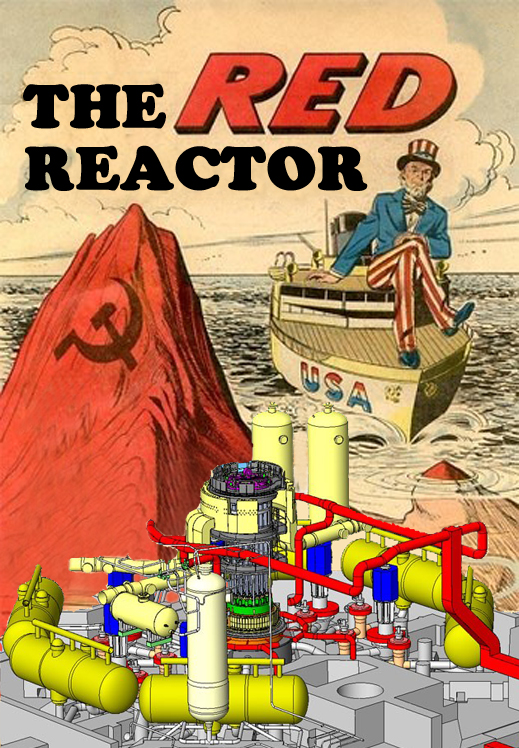
By John Helmer, Moscow
South African government officials have attacked Russia’s bid to supply South Africa’s new nuclear reactor programme, accusing Rosatom, the state nuclear power agency, of imposing financially and legally disadvantageous terms which the South Africans, speaking anonymously, term “scary”.
The attack was launched Friday in the Mail & Guardian, a local newspaper associated with the Guardian of London. Just one SA Government official, Enver Daniels, the chief state law advisor in Pretoria, was identified as behind the allegations. Speaking anonymously to the newspaper also was a group identified as “numerous”, and representing the SA ministries of energy, international relations, trade and industry, and the treasury.
The SA officials launched their attack on Rosatom after the full text of the Rosatom agreement on nuclear cooperation with South Africa was discovered openly published on a Russian Foreign Ministry website. The SA Government continues to keep the text of the Rosatom agreement classified. The accusing officials are also familiar with the terms of rival nuclear cooperation agreements signed with the French state company Areva, and with the Chinese government, in collaboration with the US. The SA officials are keeping silent on the terms of these pacts, and on a lobbying campaign by the US and France to drive the Russians out of the running for the $50 billion contract, the largest state procurement in SA history.
“Shocking details,” the newspaper reported, “of the secret nuclear deal that Energy Minister Tina Joemat-Pettersson signed with Russia last year can, for the first time, be revealed. The text, which has been jealously guarded by her department and Russian nuclear company Rosatom, holds many dangers for South Africa.”
Three reporters – Lionel Faull (below, left), Sam Sole (centre), and Stefaans Brummer (right) — claim that “once the agreement comes into force, the Russians will have a veto over South Africa doing business with any other nuclear vendor. And it will be binding for a minimum of 20 years, during which Russia can hold a gun to South Africa’s head, in effect saying: ‘Do business with us, or forget nuclear.’”

The Russian-language agreement was signed by Rosatom director-general Sergey Kirienko (below right) and South Africa’s Energy Minister Tina Joemat-Pettersson (left) on September 22 in Vienna last year, during a conference of the International Atomic Energy Agency.
The Foreign Ministry text can be read here. The document is dated September 21, but it is unclear when it was posted by the Foreign Ministry.
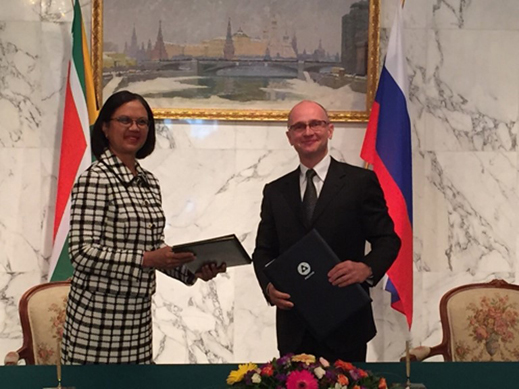
An unofficial English translation can be read here.
The full agreement text can be compared to Rosatom’s press release at the same time. According to Rosatom, the agreement provides the opportunity – not the contract commitment – for SA to acquire “new nuclear power plants with Russian VVER reactors with total installed capacity of up to 9,6 GW (up to 8 NPP units). These will be the first NPPs based on the Russian technology to be built on the African continent. The signed Agreement, besides the actual joint NPP construction, provides for comprehensive collaboration in other areas of nuclear power industry, including construction of a Russian-technology based multipurpose research reactor, assistance in the development of South-African nuclear infrastructure, education of South African nuclear specialists in Russian universities and other areas.”
“The joint implementation of this programme implies a broad localization of equipment for the new NPPs, which will provide for brand-new development of various areas of South-African high-tech industries, contribute to creation of new highly skilled workplaces and will allow South-African companies to further participate in ROSATOM’s projects in third countries.”
The Mail & Guardian reported the press release, adding that a request had been filed by an anti-nuclear power group for disclosure of the full agreement. The request has subsequently been refused by the government in Pretoria.
On October 31, the Mail & Guardian, quoting two anonymous sources, claimed “a delegation of Russian nuclear experts made it clear that they want to have a monopoly on the entire supply chain of nuclear energy. Two sources close to last week’s meeting gave details of how the Russians argued for exclusivity. Rosatom believes its services are unique and therefore they cannot partner with any other country.”
By then Energy Minister Joemat-Pettersson had gone to Paris where she signed a nuclear cooperation agreement with French Foreign Minister Laurent Fabius. The classified document, according to the French, provided “for French nuclear giant Areva to bid to build eight nuclear reactors in South Africa worth up to $50 billion (39.5 billion euros).” According to Joemat-Pettersson’s ministry, “this agreement initiates the preparatory phase for the possible deployment of French nuclear technology in South Africa.”
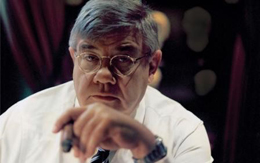 In September Areva announced it had signed a €300 million contract with SA. That triggered a court action by Westinghouse of the US alleging corruption in the contract process and a last-minute switch of the contract award from Westinghouse to Areva. Areva has made no announcement of the October “cooperation” deal. A London source says that one of the French fixers in Areva’s dealings with the South African government is Jean-Yves Ollivier (right). The source claims: “They were not happy with the Russian venture and have better ties to Zuma. I am sure that Zuma will find a way to keep the French in.”
In September Areva announced it had signed a €300 million contract with SA. That triggered a court action by Westinghouse of the US alleging corruption in the contract process and a last-minute switch of the contract award from Westinghouse to Areva. Areva has made no announcement of the October “cooperation” deal. A London source says that one of the French fixers in Areva’s dealings with the South African government is Jean-Yves Ollivier (right). The source claims: “They were not happy with the Russian venture and have better ties to Zuma. I am sure that Zuma will find a way to keep the French in.”
The Mail & Guardian did not report the Paris agreement when it was signed. The paper’s reporters have not questioned Ollivier or Areva about the exclusivity and liability provisions of the French agreement.
For details of the Chinese cooperation agreement, signed in March 2014 by a low-level Beijing official, Tan Rong Yao of the China National Energy Administration, read this.
In Moscow Rosatom denies it is seeking exclusivity. In December, Business Day, SA’s leading business newspaper, reported that the French and Chinese might combine to offer some of the reactors the SA plan calls for. Viktor Polikarpov, Rosatom’s spokesman in Moscow, acknowledged that bid-splitting and combinations of reactor technologies would be acceptable to the Russians. “Splitting the bid is ‘definitely possible’, though limited by whether the difference in technology between countries would be economically feasible, Viktor Polikarpov, Rosatom’s regional vice-president for central and southern Africa, said in an e-mailed response to questions.”
Headlined “how we got the secret document”, the Mail & Guardian reporters say they did not learn the full text of the Rosatom agreement had been published until a few days before their report last week. The journalists would have missed it entirely if they had not been tipped off by Vladimir Slivyak, a Russia-based, US-educated analyst of nuclear and other energy issues for the EcoDefence group. Slivyak said he had not seen the Rosatom agreement until a “friend” tipped him off about the website publication late in January.
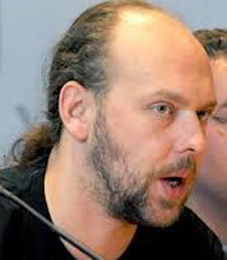 According to Slivyak (right), “I began to study the issue of [SA-Russia nuclear] cooperation in November, when we met at a conference with colleagues from South Africa and I was interested in it. Until the end of last year I had searched for this agreement on the internet I could not find anything. This year, in January, a friend of mine who works in the Ministry of Foreign Affairs sent me this text.” Slivyak said he then sent the website link of the Rosatom agreement to his colleagues at the Johannesburg-based organization, Earth Life. The Mail & Guardian was informed a few days into this month.
According to Slivyak (right), “I began to study the issue of [SA-Russia nuclear] cooperation in November, when we met at a conference with colleagues from South Africa and I was interested in it. Until the end of last year I had searched for this agreement on the internet I could not find anything. This year, in January, a friend of mine who works in the Ministry of Foreign Affairs sent me this text.” Slivyak said he then sent the website link of the Rosatom agreement to his colleagues at the Johannesburg-based organization, Earth Life. The Mail & Guardian was informed a few days into this month.
Slivyak is a critic of President Vladimir Putin. He has publicly attacked Russian policy in Ukraine in EU publications; and since the start of war last March, he has backed sanctions against Rosatom. Slivyak acknowledges that his organization receives funding from the European Commission and that it has come under attack from the Russian authorities for failing to register as a foreign agent. “It turns out that in Russia today, the government sees us as a huge threat. It is unfortunate that organizations that are working to protect the rights of Russian citizens are enemies of the authorities. At the same time, all this gives a comprehensive description of the political regime in Russia.”
A notation — НЕ ДЕЙСТВУЕТ — at the top of the Rosatom agreement indicates that the pact has not been ratified by the Russian or SA parliaments, and is thus not yet in force.
Vladimir Chuprov, head of energy analysis at the Greenpeace office in Moscow, says there is nothing exceptional in the public release of the agreement between the two governments. Such agreements, he said, are general and non-binding in nature, and “can be published before ratification. Usually, they don’t publish the [financial terms in the] credit agreements. That’s where the most interesting things are.”
A review of the Foreign Ministry website reveals public texts of recent Russian nuclear cooperation agreements with Hungary, Finland, Croatia, Armenia, and Belarus. The Mail & Guardian reporters have not compared these with the SA agreement.
According to the SA government officials who interpreted the Russian agreement for the Mail & Guardian reporters, the “scary” provisions in the agreement provide “indemnif[ication for] the Russians from any liability arising from nuclear accidents during the reactors’ life… Hand the Russians a host of regulatory concessions and “special favourable treatment” in tax and other financial matters, but offer South Africa no such incentives; and require Russia’s permission if South Africa wants to export nuclear technology it develops locally as a result of learning from the Russians, thereby hindering government’s aim that the nuclear new-build programme will develop a globally competitive local nuclear industry.”
The Mail & Guardian concludes in an editorial that Rosatom’s agreement “is a lopsided, murky and legally fraught arrangement that hands most of the aces to Russia’s state-owned nuclear company and carries significant risks for South Africa… [It] appears to sidestep the constitutional and legal requirement of an open, competitive process, all but guaranteeing the adoption of Russian technology. The contrast with South Africa’s nonspecific “agreements to agree” with the United States and South Korea is stark.”
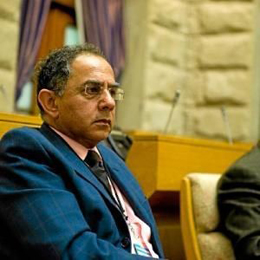 Daniels (right), the state legal adviser who has been reported as one of the sources of the Mail & Guardian’s interpretation of the Russian agreement, has been under attack himself in SA. He has been accused of incompetent legal advice, negligence, and racial prejudice. “Daniels and his cohorts have not been at the top of their game for a long while, if ever,” reported The Daily Maverick, an investigative journalism website from Johannesburg in 2012. The Mail & Guardian has also criticized Daniels for “poor judgement” and for failing to “deliver value for money”.
Daniels (right), the state legal adviser who has been reported as one of the sources of the Mail & Guardian’s interpretation of the Russian agreement, has been under attack himself in SA. He has been accused of incompetent legal advice, negligence, and racial prejudice. “Daniels and his cohorts have not been at the top of their game for a long while, if ever,” reported The Daily Maverick, an investigative journalism website from Johannesburg in 2012. The Mail & Guardian has also criticized Daniels for “poor judgement” and for failing to “deliver value for money”.
A Cape Town source says Daniels is trying to save his job and his reputation by “pretending to be South Africa’s defender against the Russians.”
Rosatom says it cannot respond to Daniels or to the anonymous allegations because its hands have been tied by the SA Government. A Rosatom spokesman in Johannesburg, Ryan Collyer, claims that Rosatom is waiting on the Energy Department to frame a joint response to questions about the agreement.
Moscow sources say Rosatom is well aware that the US and French governments have been lobbying to discredit the Russian bid. Their activities have intensified since the start of the Ukraine war last March and the US and European Union sanctions. According to Rosatom chief Kirienko, on March 27, 2014, “ some international contracts of Rosatom may fall under restrictions due to possible economic sanctions of the West…Taking into account a number of comments about the possible limitations of economic relations, we understand that some of the [international] contracts may be under political constraints.” Last June, Tenex, the enriched fuel export unit of the Rosatom group, issued an explicit statement that sanctions were not interfering with or restricting its business.
To date, no individual or corporate unit of the Rosatom group has been designated on any of the sanctions lists issued by the US, Canada, the European Union, Switzerland, or other countries. For the full sanctions list, updated to December 23, 2014, see: http://www.riskadvisory.net. No individual management executive of the Rosatom group has been sanctioned. In addition to Kirienko, the Rosatom Supervisory Board currently comprises: Boris Gryzlov (National Security Council), Igor Borovkov (Prime Ministry), Larissa Brychyova (Legal Adviser to President), Andrei Klepach (Rosatom chief economist), Alexander Novak (Minister of Energy), Yury Trutnev (Deputy Prime Minister), and Yury Yakovlev (Federal Security Service). Only one, Gryzlov, a former parliament speaker and member of the Security Council, has been sanctioned.
For the involvement of President Jacob Zuma and other SA officials in the Russian negotiations over the past two years, open this archive.
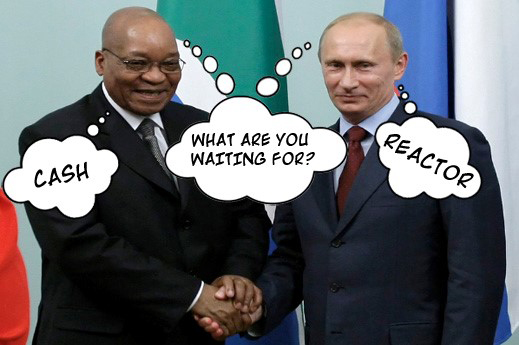
SA sources report growing concern in Pretoria that alleged corruption in Zuma’s circle has encouraged the Kremlin to favour the development of its relationship with President Robert Mugabe and candidate successors in Zimbabwe. For Russia’s planned investment in Zimbabwe, and the proposed build-up of a rival to South Africa’s military forces, read this.
Just before the Mail & Guardian launched last week’s red scare, Polikarpov for Rosatom commented that the negotiations process is divided into three phases — the cooperation agreement phase, the vendor presentation phase – together, a pre-procurement preparatory phase – and the procurement phase leading to a contract award. This phasing or staging was also referred to by the SA presidential spokesman, Mac Maharaj, in mid-December. According to Polikarpov, “the current status of negotiation process between Rosatom and South Africa about NPP construction. South Africa and Russia signed an inter-government agreement on cooperation in the area of nuclear energy on the 22nd of September 2014. The agreement focused on multi-purpose nuclear research, assistance in the development of South-African nuclear infrastructure, education of South African nuclear specialists in Russian universities and other areas. Following the agreement, Rosatom was invited to participate in the nuclear vendor parades hosted by the South African Department of Energy. The Russian vendor parade was very comprehensive and covered every aspect of the proposed nuclear build in South Africa. The objective was to present the company’s technological capabilities, approach to localisation, skills transfer and development. Rosatom is currently the only company in the world able to offer a full range of services in the nuclear industry from the fuel supply to NPP construction, from nuclear medicine to technologies of storage of nuclear waste. Moreover, Rosatom has a broad range of financing options available for the construction of Nuclear Power Plants and is committed to the highest possible level of localisation in South Africa. From our understanding the government has concluded the pre-procurement preparatory phase for the Nuclear New Build Programme and we are now looking forward to participating in the procurement process, which we are certain will be in line with the country’s legislation and policies. Rosatom is committed to a transparent, fair and competitive procurement process for the nuclear new-build programme in South Africa.”
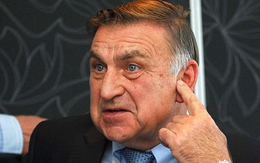 Asked to clarify the timing of the procurement process, Polikarpov (right) added: “Unfortunately at this time it would be extremely difficult for us to put a time line on the procurement process, as this will be laid out by the South African government. We can say that we will be ready and willing to participate in the procurement process when it commences.” Yesterday Polikarpov refused to respond to the red scare claims.
Asked to clarify the timing of the procurement process, Polikarpov (right) added: “Unfortunately at this time it would be extremely difficult for us to put a time line on the procurement process, as this will be laid out by the South African government. We can say that we will be ready and willing to participate in the procurement process when it commences.” Yesterday Polikarpov refused to respond to the red scare claims.
Independent European nuclear industry sources say the reported allegations against the Rosatom agreement are not borne out by the published text. According to one source, “this misreading is a deliberate effort that benefits Areva, the Chinese and Americans. It also plays domestic politics in Pretoria.”
One of the sources says that all three agreements – Russian, French, and Sino-American – attempt to influence the tender phase for the reactor purchase in favour of each country’s proprietary technology. The Russian agreement isn’t different on that score, the source claims, except that it isn’t secret. In the published text, Rosatom concedes that the SA Government is free to decide to build 2 Russian technology reactors (2.4GW capacity), and to reserve its decision on what technology to buy for the remaining reactors (7.2GW).
The sources also say the operative term in the agreement is “cooperate”, which is noncommittal. They point to the provision in Art 4.2 – “the mechanism of the practical implementation of these priority projects will be governed by separate intergovernmental agreements” – to leave undecided now, and uncommitted in future, what technological choices the SA Government can reserve. Art. 7 of the agreement also provides for several suppliers of reactors by saying: “The Competent Authorities of the Parties can, by mutual consent, involve third countries’ organizations for the implementation of particular cooperation areas under this Agreement.”
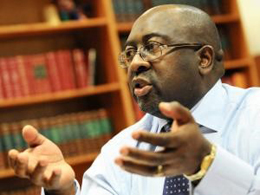 The liability provisions of the Rosatom agreement, according to the Mail & Guardian, were opposed by legal advisor Daniels and the SA Department of Treasury and Finance, headed by Nhlanhla Musa Nene (right). “Should anything go wrong,” the newspaper reports,“the fallout would be South Africa’s problem.”
The liability provisions of the Rosatom agreement, according to the Mail & Guardian, were opposed by legal advisor Daniels and the SA Department of Treasury and Finance, headed by Nhlanhla Musa Nene (right). “Should anything go wrong,” the newspaper reports,“the fallout would be South Africa’s problem.”
“The treasury, which would have to pay for any damage, opposed this [liability] clause. So, too, did Daniels, who referred to its ‘broad and almost boundless nature’ as being ‘a particularly sticky issue’ in the memorandum seen by amaBhungane [the investigative unit of the newspaper]. Similar protestations about this clause from a cross-section of other government officials were ignored. The Russians are known to have offered South Africa a ‘build-own-operate’ model of nuclear construction financing that, if realised, could give them incentives to cut corners on safety during construction and operation.”
Independent readers of the agreement say that this reading of the Russian text on liability fails to explain the meaning of Art 15.2, which provides for Russian liability during transportation to SA until or “after actual delivery of nuclear fuel” to SA territory. The sources say the reporters have confused the meaning in the agreement between “responsibility” and “liability”. The sources also charge the reporters with failing to explain the implied sharing of liability in the provision: “The South African Party shall ensure that, under no circumstances shall the Russian Party or its competent authorities or authorized organizationa. nor Russian organizations authorized and their appointed suppliers be liable for such damages ahead of the South African Party and its Competent authorities, and ahead of its authorized organizations and third parties.”
Art.15 (3) of the Rosatom agreement raises a key issue of liability which the South Africans have yet to clarify. According to the text, “In case the Vienna Convention on Civil Liability for Nuclear Damage enters into force for the Republic of South Africa, the questions of civil liability of the South African Party for nuclear damage under this Agreement shall be regulated by the said Vienna Convention.”
The convention was first adopted in 1977. It was accepted by the Russian Federation in 1996 and ratified in 2005. South Africa has refused to do either. Normal practice in the international nuclear industry, and in the insurance of reactors, is to restrict liability to operators, not suppliers. For an assessment of the principles and remedies of the Vienna Convention and international practice, read this.
At present, South Africa is one of the few nuclear-power states to accept no nuclear incident liability convention; the others, as the tabulation illustrates, are China, Iran, Pakistan, Taiwan, and Korea.

PC = Paris Convention (PC). RPC = 2004 Revised Paris Protocol. Not yet in force
BSC = Brussels Supplementary Convention. RBSC = 2004 Revised Brussels Supplementary Convention. Not yet in force
VC = Vienna Convention. RVC = Revised Vienna Convention
JP = 1988 Joint Protocol.
CSC = Convention on Supplementary Compensation for Nuclear Damage (CSC). Not yet in force.
* India has signed the CSC but has not yet ratified it, and it is not yet clear whether their domestic liability law conforms with the requirements of the convention.
Source: http://www.world-nuclear.org/info/Safety-and-Security/Safety-of-Plants/Liability-for-Nuclear-Damage/
According to an industry expert, “the press coverage in South Africa blames Rosatom for following the international practice, without knowing that the French and Chinese agreements are likely to say much the same thing. It puts the blame on the Russians when it is South African practice which is at variance with the international practice.” Rosatom’s nuclear cooperation agreements with Hungary in January 2014 and Finland in February 2014, also published on the Foreign Ministry website, expressly provide for liability according to the international conventions which those countries have adopted.
The Mail & Guardian acknowledges it doesn’t know why the South African Government has refused to ratify the international conventions, or what difference this would make to the Rosatom provision for liability.











Leave a Reply